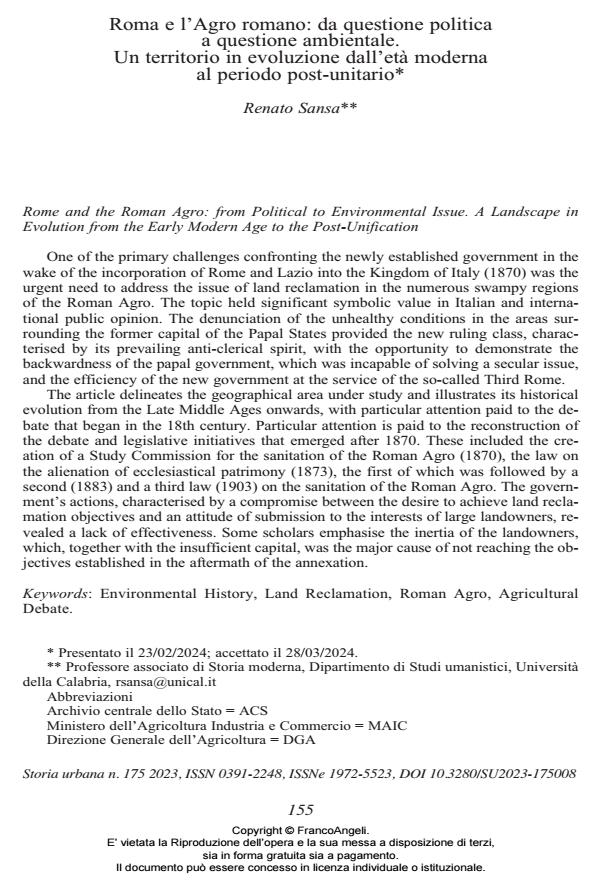Rome and the Roman Agro: from Political to Environmental Issue. A Landscape in Evolution from the Early Modern Age to the Post-Unification
Journal title STORIA URBANA
Author/s Renato Sansa
Publishing Year 2024 Issue 2023/175
Language Italian Pages 27 P. 155-181 File size 350 KB
DOI 10.3280/SU2023-175008
DOI is like a bar code for intellectual property: to have more infomation
click here
Below, you can see the article first page
If you want to buy this article in PDF format, you can do it, following the instructions to buy download credits

FrancoAngeli is member of Publishers International Linking Association, Inc (PILA), a not-for-profit association which run the CrossRef service enabling links to and from online scholarly content.
One of the primary challenges confronting the newly established government in the wake of the incorporation of Rome and Lazio into the Kingdom of Italy (1870) was the urgent need to address the issue of land reclamation in the numerous swampy regions of the Roman Agro. The topic held significant symbolic value in Italian and interna- tional public opinion. The denunciation of the unhealthy conditions in the areas sur- rounding the former capital of the Papal States provided the new ruling class, charac- terised by its prevailing anti-clerical spirit, with the opportunity to demonstrate the backwardness of the papal government, which was incapable of solving a secular issue, and the efficiency of the new government at the service of the so-called Third Rome. The article delineates the geographical area under study and illustrates its historical evolution from the Late Middle Ages onwards, with particular attention paid to the de- bate that began in the 18th century. Particular attention is paid to the reconstruction of the debate and legislative initiatives that emerged after 1870. These included the cre- ation of a Study Commission for the sanitation of the Roman Agro (1870), the law on the alienation of ecclesiastical patrimony (1873), the first of which was followed by a second (1883) and a third law (1903) on the sanitation of the Roman Agro. The govern- ment’s actions, characterised by a compromise between the desire to achieve land recla- mation objectives and an attitude of submission to the interests of large landowners, re- vealed a lack of effectiveness. Some scholars emphasise the inertia of the landowners, which, together with the insufficient capital, was the major cause of not reaching the ob- jectives established in the aftermath of the annexation. Keywords: Environmental History, Land Reclamation, Roman Agro, Agricultural Debate.
Keywords: Bonifica, Agro romano, Dibattito sull’agricoltura, Storia ambientale
Renato Sansa, Roma e l’Agro romano: da questione politica a questione ambientale. Un territorio in evoluzione dall’età moderna al periodo post-unitario in "STORIA URBANA " 175/2023, pp 155-181, DOI: 10.3280/SU2023-175008